IRES fostered alum Emma Gillies’s love of learning
Emma Gillies graduated from the RES program with an MSc in 2022, under the supervision of Dr. Amanda Giang.
While at IRES, her research involved modelling mercury bioaccumulation in Beaufort Sea beluga whales using Indigenous Knowledge and Western Science. She maintains interests in climate change, ecotoxicology, environmental policy, and the connections between environmental and public health. She is now a biologist for Fisheries and Oceans Canada.
We asked Emma a few questions to learn about what she gained at IRES and how those skills help her in her current position. Check out her answers below!
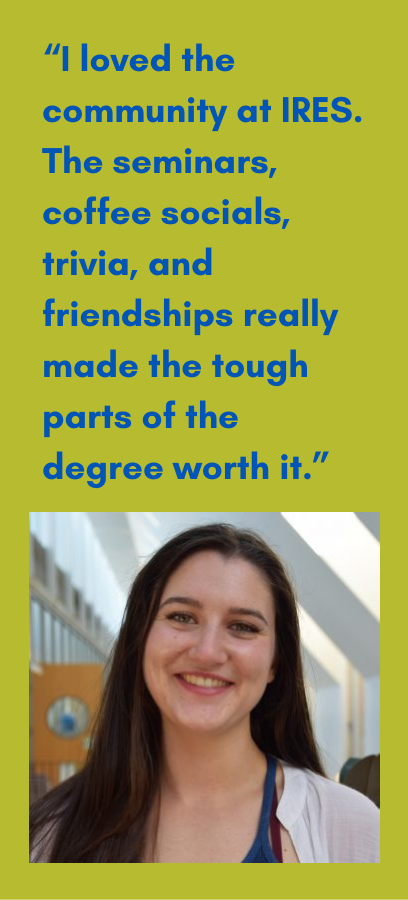
Question: Please describe why you chose to pursue your graduate studies at IRES.
Answer: I decided to pursue my Master’s degree at IRES because I really wanted to pursue a research project, but I also really wanted to do coursework, and I felt that IRES had a good mix of both. The research that I had the opportunity to do under Dr. Amanda Giang felt like a perfect fit, and I liked that the program was interdisciplinary. Coming from an environmental science background, I wanted to further my education in the natural sciences while also exposing myself to other areas, especially policy. Another very important factor for me was that the program was well-funded.
Question: What values, practices, or activities did you enjoy at IRES?
Answer: I loved the community at IRES. The seminars, coffee socials, trivia, and friendships really made the tough parts of the degree worth it. I also loved all of the opportunities to learn. Since the program is so interdisciplinary, I felt that I was constantly learning from fellow IRES students, lab mates, and students from other programs, as well as from professors, lectures in the unit’s seminar series, and internship opportunities. IRES offered the unique opportunity to really dive into my specific area of study while also making the most of other opportunities—for instance, I was able to be a TA for a marine pollution course, take an investigative journalism class, present my research at multiple conferences, and attend networking events.

Question: In what ways did your experience in IRES help prepare you for what you do now?
Answer: I’m currently working as a biologist for Fisheries and Oceans Canada (a department of the Canadian federal government), where I often interact with both policy and science, as well as with colleagues from many different disciplines. My training in IRES not only strengthened my technical skills (for example in data analysis, qualitative methods, and marine ecology) but also less tangible—and often overlooked—skills, such as the ability to think critically, ask questions, and work in a team. IRES also really fostered my love of learning, something that I still continue outside of my job today through attending seminars and volunteering with Vancouver organizations.
We’re proud of our all our alumni! Learn about more of them here.
April 4, 2024: IRES Professional Development Seminar with Dr. Mark Drever
Wildlife Science in the federal government: Western Sandpipers, intertidal biofilm, and ecosystem health in the Fraser River estuary
Location: Beaty Museum Allan Yap Theatre (Basement, 2212 Main Mall). Please check in at front desk on main floor before going downstairs.
No food or drinks allowed in the Theatre.
Time: 12:30pm to 1:20pm
This seminar will not be recorded.
Click here to register for Zoom link. Zoom will be terminated if we encounter tech problems 5 to 10 mins into the seminar.
Talk summary:
This talk will detail ongoing research on Western Sandpipers and their reliance on essential nutrients available on intertidal biofilm, a thin layer of microalgae and other organisms found on surface sediments of intertidal mudflats. It will cover a bit of what life is like working as a research scientist for the Canadian federal government, and the interface between science and policy on conservation and development in one of Canada’s busiest working estuaries.
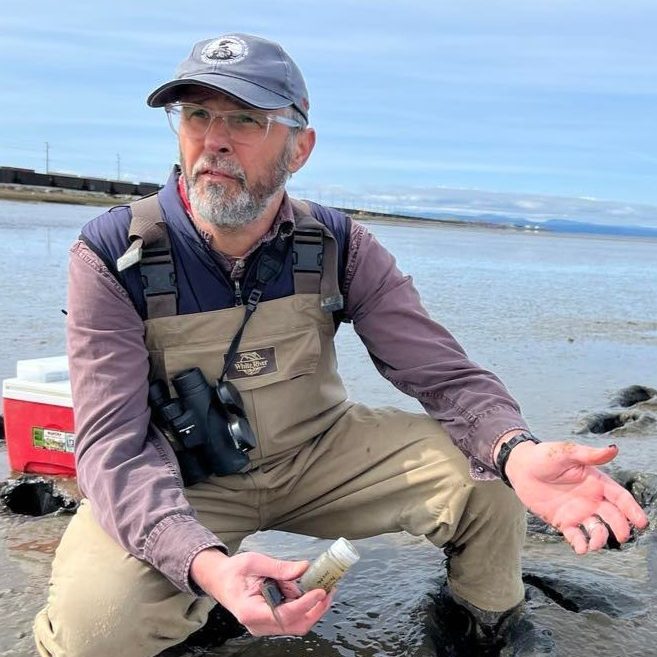
Bio:
Dr. Mark Drever is a research scientist with Environment and Climate Change Canada (ECCC) working on ecology and conservation of coastal birds. He received his PhD from the University of Guelph in 2005 and worked as an NSERC postdoctoral fellow with Kathy Martin in the Department of Forest and Conservation Sciences at UBC. Since signing on to ECCC in 2010, he has developed a research program on sandpipers using estuaries as migratory stopovers, including their foraging on intertidal microalgae. This program involves shorebird tracking, chemical analyses, and drone technology to look at how coastal mudflats provide essential nutrients for long-distance migration of shorebirds.
Wanting to do actionable research brought alum Claire Ewing to IRES
Claire Ewing graduated from the RES program with an MSc in 2021, under the co-supervision of Drs. David Boyd and Amanda Giang.
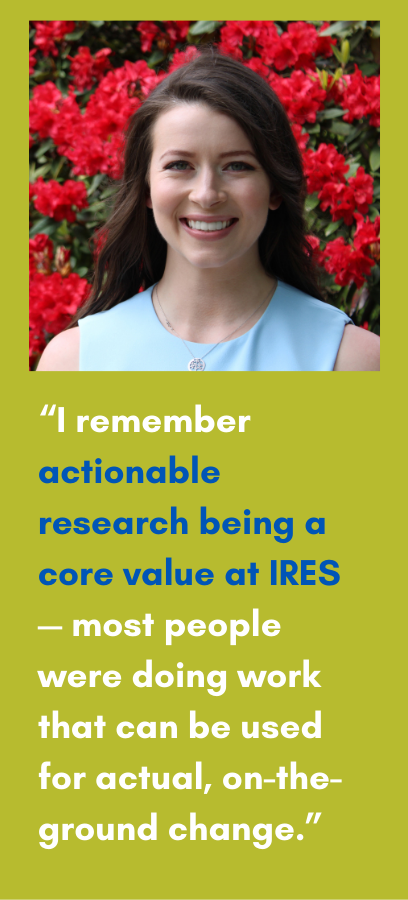
While at IRES, she created a new, publicly available dataset of air pollution enforcement actions in Canada, which required numerous Freedom of Information and Protection of Privacy (FOIPOP) requests. She is now a Senior Policy and Planning Analyst at Metro Vancouver, contributing to the development and implementation of Vancouver’s Climate 2050 Strategy and Clean Air Plan, with a particular focus on greenhouse gas reductions for buildings, transportation, and industry.
Read on to find out what brought Claire to IRES, and how her experiences helped her find her current role.
Question: What values do you remember being in the air at IRES?
Answer: I remember actionable research being a core value at IRES— most people were doing work that can be used for actual, on-the-ground change. This was a key reason I chose to come to IRES; I wanted to substantively contribute to “sustainability” through my studies. I also remember well-roundedness being valued at IRES. Students learn about a broad spectrum of sustainability/environmental topics through the IRES course requirements, which many students leverage in doing interdisciplinary research.
Question: In what ways did your experiences at IRES help prepare you for what you do now?
Answer: My Master’s research at IRES was about air pollution policy and enforcement in Canada, which prepared me well to work on climate policy in a Canadian government. I developed skills through my research and courses I took while at IRES, such as using qualitative and quantitative analytical methods. Perhaps most importantly, it helped me learn what I wanted (and didn’t) from my future career and what sectors within the ever-broadening field of ‘sustainability’ I was interested in joining.
Question: How did you find your current position?
Answer: I did a Sustainability Scholars internship at Metro Vancouver (my current employer) the summer before I graduated from IRES. During my internship, I networked with people around Metro Vancouver and beyond. When the job posting for my position was posted online, my former Sustainability Scholars mentor sent it to me and encouraged me to apply.
We’re proud of our all our alumni! Learn about more of them here.
At IRES, alum Alejandra Echeverri Ochoa combined social and ecological sciences
Current Assistant Professor Alejandra Echeverri Ochoa came to IRES to study environmental policies and the social issues around protecting biodiversity. After completing her MSc at IRES, she found that our unit was an ideal place to continue on for her PhD.

Check out the graphic above! It shows that IRES allowed Echeverri Ochoa to draw upon her past experiences and deep interests in ornithology, conservation and policy-making.

Echeverri Ochoa graduated from the RES program with a PhD in 2019 under the co-supervision of Drs. Kai Chan and Jiaying Zhao. While at IRES, she developed a framework for assessing the different non-material benefits of wildlife (“cultural ecosystem services”), as accruing to different groups of people. She is now Assistant Professor of Conservation Science at UC Berkeley. Her research sits at the intersection of Neotropical ornithology, conservation psychology, environmental policy, and community ecology, with a lab group that integrates biological field work (such as bird surveys) with quantitative social surveys and qualitative content analysis to understand human relationships with nature.
“Looking back on my experience at IRES, I’m struck by its remarkable diversity and inclusivity. It was a regular occurrence to encounter colleagues from various racial, ethnic, socio-economic, and gender backgrounds,” said Echeverri Ochoa. “We collectively spoke multiple languages and came from diverse places on the planet. The institution’s international character, coupled with its commitment to inclusivity, is truly unique and not easily found elsewhere.”
She wants future RES alumni and recent graduates to know that the academic job market is quite challenging, but that UBC is a good place to build up a network. In fact, connections from her time at IRES helped Echeverri Ochoa find her current position.
“Interestingly, my current academic position was recommended to me by four individuals, two of whom are UBC alumni, alongside other colleagues I’d connected with during graduate school and postdoctoral conferences,” she said. “I submitted applications to 17 job ads, encompassing 3 academic roles and 14 in science-policy fields. The majority of these opportunities were discovered via LinkedIn or through recruiters reaching out to me via Handshake. Truly, the job application process demands a full-time commitment; patience and openness to unexpected opportunities are key!”
We’re proud of our all our alumni! Learn about more of them here.
April 11, 2024: IRES Faculty Seminar with Michael Brauer
Estimating the global health impacts from environmental risks
Location: Beaty Museum Allan Yap Theatre (Basement, 2212 Main Mall). Please check in at front desk on main floor before going downstairs.
No food or drinks allowed in the Theatre.
Time: 12:30pm to 1:20pm
View Video Here
Talk summary:
Understanding health impacts of environmental risk factors can aid in prioritization of management policies. In the context of the Global Burden of Disease project we estimated the disease burden attributable to 12 environmental risk factors for 1990 – 2021 differentiated by age and sex for 204 countries. In 2021, ambient particulate matter (PM2.5) air pollution was the leading global environmental risk factor accounting for 4.2% of all disease burden 4.7 million (M) deaths, followed by household air pollution (3.9%, 3.1M) and unsafe water (1.4%, 0.8M). Since 2000, exposures to household air pollution, nitrogen dioxide, unsafe water and unsafe sanitation have reduced dramatically. Reductions in exposure to cold temperatures, radon and lead have been observed but these have been insufficient to offset population growth and aging, resulting in increased attributable disease burden, while exposures to warm temperatures, ozone and ambient particulate matter pollution have increased, suggesting a need for more concerted actions.

School of Population and Public Health, UBC
Bio:
Michael Brauer is a Professor in the School of Population and Public Health at The University of British Columbia and a Principal Research Scientist and Affiliate Professor at the Institute for Health Metrics and Evaluation at the University of Washington, where he leads the Environmental, Occupational and Dietary Risk Factors team for the Global Burden of Disease. His research focuses on linkages between the built environment and human health, with specific interest in the global health impacts of air pollution, the relationships between multiple exposures mediated by urban form and population health, and health impacts of a changing climate. He has participated in monitoring and epidemiological studies throughout the world and served on numerous committees, including those advising the World Health Organization, the Climate and Clean Air Coalition, the World Heart Federation, the US National Academies, the Royal Society of Canada, the International Joint Commission and governments in North America and Asia. His contributions to environmental health have been recognized by a number of career achievement and publication awards.
April 18, 2024: IRES Student Symposium with Lindah Ddamba, Remzi Xhemalce-Fuentes, Dayna Rachkowski (Last Seminar in Term 2)
1. Energy Transitions in Sub-Saharan Africa: A Review of the Factors Inhibiting Accelerated Progress. View Video
2. EXPLORING EMPOWERMENT THROUGH BILL S-5: building government accountability in chemicals management using a right to a healthy environment
3. IMAGINING POSSIBLE ROLES FOR GREEN HYDROGEN IN MEXICO. Between Hype and a Leapfrogging Opportunity
Time: 11:00am to 1:30pm
Location: AERL Theatre, Room 120 (2202 Main Mall).
Click here to register for Zoom link. Zoom will be terminated if we encounter tech problems 5 to 10 mins into the seminar.
IRES Student Symposium Agenda
11am to 12pm – Speakers Lindah Ddamba and Dayna Rachkowski
1pm to 1:30pm – Speaker Remzi Xhemalce
Talk summary:
View Video
The existential threat posed by climate change has propagated a global movement towards the transition from the use of fossils to the development of renewable sources of resources. The Paris Accord and subsequent climate treaties recognize the need to reduce the unabated use of coal and increase investments in renewables. Notably, while nearly 200 countries acceded to the global climate pacts, some countries (particularly in the global South), have rejected the aggressive phaseout of coal, citing the need for a just and gradual transition that mitigates the financial and economic risks of eliminating fossils. The UNFCCC (2021) reported in its NDC Synthesis Report that several national action plans fall short of the required action to mitigate climate change which may push performance to a maximum threshold of only 3.5 degrees Celsius global warming by 2100 above the desired target of limiting global warming below 2 degrees Celsius (if possible 1.5 degrees) of the pre-industrial temperatures. The evidence documents the existence of enabling policies and vast green resources in the Sub-Saharan region. However, the region continues to lag behind on its climate goals. A number of political promises have been made including a target to attain 100% transition to green energy by 2030 – which is deemed to be ‘overly ambitious’ by the international community. In this thesis, I explore energy transitions in Sub-Saharan Africa with a focus on Kenya, Uganda and South-Africa – examining trends, challenges and future prospects.
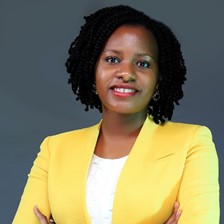
Bio:
Lindah holds a bachelor’s degree in law from Makerere University, Uganda (2010) and a Master of Laws Degree (2014) from the University of Toronto- Canada, where she majored in energy regulation and resource governance. Shortly thereafter, she worked as a Senior Legal Officer of the Uganda Electricity Regulatory Authority for four years. Her role involved the evaluation of electricity projects for development and she worked on a number of electricity policies and laws. Her research focus at IRES is on the promotion of renewables, where she seeks to evaluate the obstacles to accelerated energy transitions in developing economies with a focus on Sub-Saharan Africa.
Talk summary:
The Canadian Environmental Protection Act (1999) has just faced significant revision. CEPA regulates all commercial chemicals in Canada, and is now the first place in legislation that Indigenous peoples and Canadians have ever been given a legal right to a healthy environment.
The aim of this work is to understand how Bill S-5 may be used by Indigenous peoples in Canada to hold the government accountable for the prioritization of human and environmental health. This work will use Sarnia Ontario – home to Aamjiwnaang First Nation, and 40% of Canada’s petrochemical industry, as a case study for what environmental and health forward accountability may look like regarding chemical use and regulatory processes.
Dayna’s presentation will give an overview of; the commitments made in Bill S-5, chemical regulation processes & risk assessments in Canada, rights to a healthy environment, and review her qualitative semi structured interview data with those who hold expertise on law & policy, Indigenous knowledge systems & those with lived experience of chemical exposure.
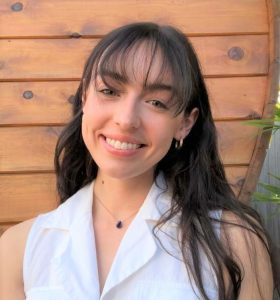
Bio:
Dayna Rachkowski (She/Her) is an MA student supervised by Dr. Gunilla Oberg in the EGESTA Lab. Dayna previously attended the University of Guelph (BA of Honours Environmental Governance) providing her with an interdisciplinary background studying political science, economics, and geography. Dayna is curious to understand the relationship between science and policy, and how implementing effective and well communicated legislation can help those living in Canada hold their government accountable for maintaining a healthy environment. Dayna is a SSHRC recipient, a climate teaching coordinator, and the community engagement representative for the IRES Student Society.
Talk summary:
Amid global shifts towards net-zero emissions, hydrogen emerges as a pivotal solution, especially for the hard-to-electrify sector. Mexico, an upper-middle-income nation and significant oil producer, grapples with substantial greenhouse gas emissions. Recent efforts to revitalize the oil sector have led to setbacks in climate policy, particularly in energy. Political polarization over energy independence versus security has hindered renewable energy adoption and new transmission capacity. Against this backdrop, hydrogen gains prominence as a versatile energy carrier, offering solutions to store variable renewable energy. With renewable energy capacity allocated for green hydrogen production, Mexico could capitalize on this growing market. This research evaluates hydrogen’s potential as an environmental, business, and energy transition opportunity for Mexico. Employing a problem-driven framework, the study examines hydrogen’s role across three tailor-made political scenarios. Deliverables include policy recommendations for a potential national hydrogen strategy, an energy storage assessment, and break-even price estimations for power-to-gas plants.
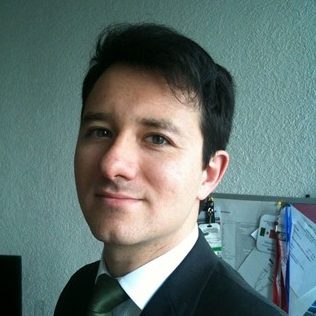
Bio:
Remzi M. Xhemalce-Fuentes (he/him) is a Ph.D. Candidate at the Institute for Resources, Environment and Sustainability of the University of British Columbia in Vancouver. From 2013 to 2019 he worked for the Federal government of Mexico. In his role as Director for International Oil Markets at the Office of the Secretary of Energy of Mexico, he advised the office of the Secretary on international best practices on oil and gas policy. As Deputy Director for International Affairs, he oversaw the cooperation between Mexico and selected international energy organizations including OPEC, the International Renewable Energy Agency and the Energy Working Group of the G20.
He also led the energy consultancy company R&A Bioenergy from 2008 to 2011. He is currently researching the role of Hydrogen as a renewable energy storage option and as an energy carrier for hard-to-electrify sectors.
Remzi enjoys sailing, climbing, skiing and exploring the outdoors with his dog Wookiee